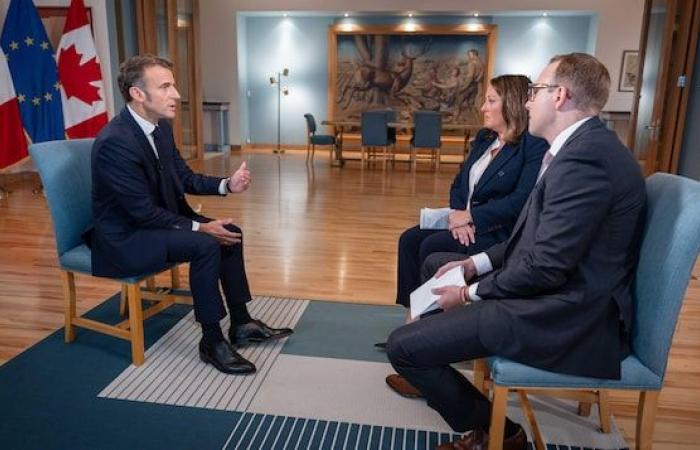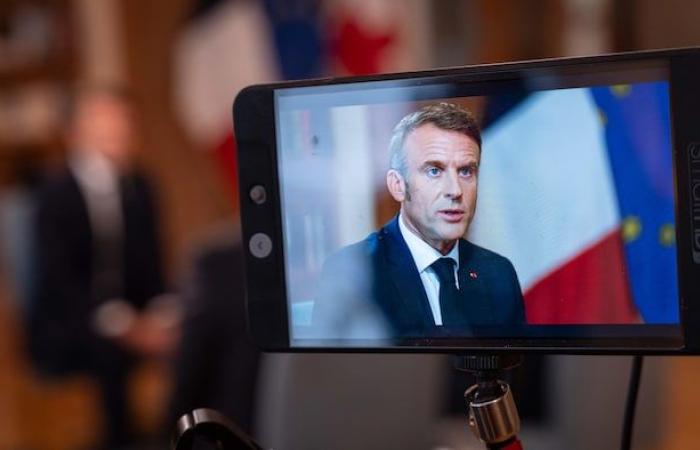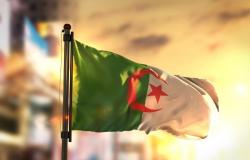French President Emmanuel Macron considers reaffirming the position of “non-interference, non-indifference” (also called “neither-nor”), which describes his country’s historical position towards Quebec and its future in the federation Canadian, would only add “emotion” to a debate that he knows is “tense”.
In a bilingual interview offered by the Élysée to CBC/Radio-Canada, which was recorded Thursday morning at the French embassy in Canada, in Ottawa, Mr. Macron did not want to adopt the established expression, which former Prime Minister Gabriel Attal reiterated during his visit to Quebec last spring.
Used for the first time under Valéry Giscard d’Estaing in 1977, the expression “ni-ni” has been used by all French heads of state since, with the exception of Nicolas Sarkozy, who reigned over France from 2007 to 2012, and who openly advocated for Canadian unity.
It’s good that predecessors did this, but do I need to do this today? In truth, in a political context that will not have escaped anyone, I do not want to interfere in your national political context
explained Mr. Macron to journalists Louis Blouin and Rosemary Barton on Thursday.
I think that the role of the French president in a moment when tempers are flaring is not to add complexity, or emotion.
he said.
I’m not here to lecture Canadians or tell them what I would be for. I am there as a respectful friend who loves each of its components.
We have a very different model on many subjects, which we assume, which is sometimes not understood here, continued Mr. Macron. But on institutional and political questions, the role of the French president is not to explain what he thinks is good.
Especially not in a world already hit by wars
he added.
French President Emmanuel Macron granted an interview of approximately 25 minutes to CBC/Radio-Canada on Thursday morning at the French Embassy in Canada.
Photo: Radio-Canada / Jean-François Benoît
Such comments from Emmanuel Macron risk disappointing Quebec separatists, at a time when the P.Q.leading the polls since his victory in the riding of Jean-Talon last fall, has promised to hold a third referendum on sovereignty if he returns to power.
But the visit of the French president also and above all comes in a tense climate in Ottawa, where the conservatives are trying to bring down the liberal government of Justin Trudeau, a minority in the House of Commons, and whose survival depends largely on ongoing negotiations with the Bloc Québécois.
On this subject, Mr. Macron, who knows well the danger that an unstable Parliament can represent, denies having advised his host anything since Wednesday. We listen to each other, we respect each other
he said, ensuring that he hadestimated
even of friendship
for Mr. Trudeau and for everything he did
.
I believe that his path, which he proposed to you and which you have validated in several elections, is the right one. That is to say, that of an open, dynamic, innovative economy that is moving towards decarbonization. And it is also the one that I am pursuing for France, with unprecedented results for our country.
On a more personal note, Mr. Macron nevertheless recalled that public life had its share of hazards. I think that, in political life, as in love life, as in life in general, there are moments which are very easy, and there are moments which are more difficult.
he philosophized.
In search of lasting peace in the Middle East and Europe
Asked about the conflict between Hezbollah and Israel, the president of France – who, in a statement supported by many countries, including the United States and Canada, called on Thursday for a immediate 21-day ceasefire
between the two parties – reiterated that the Jewish state must respect the sovereignty of Lebanon.
However, he was reluctant to increase his country’s military presence in the region. After all, France is one of the historical contributors
of the United Nations Interim Force in Lebanon (UNIFIL) and several hundred
of its soldiers are already engaged in this mission, he recalled.
Not to mention that this Force can only exercise its role in support of the Lebanese armies which, today, are not sufficiently present
explained Mr. Macron, deploring that the troops which compose it are taking extremely large risks
.
Open in full screen mode
Emmanuel Macron’s France calls for “an immediate 21-day ceasefire” in Lebanon, as do the United States, Canada, the European Union, Australia, Germany, Italy, Japan, Saudi Arabia, the United Arab Emirates and Qatar.
Photo: Radio-Canada / Jean-François Benoît
And if it is not envisaged, at least for the moment, to deploy more French soldiers in Lebanon, the president, who has already affirmed that the sending of Western troops to Ukraine could not “be excluded”, n did not wish speculate
on its current strategy regarding the war between kyiv and Moscow.
Let’s stop saying every day, in response to questions: “There is a red line, I won’t do that, I won’t do that.” Because in fact, we are weakening Ukraine by doing this, by creating scenarios
enjoined Mr. Macron.
We are democracies, we debate, there are votes in Parliament, very good, it is normal that there are these questions, he conceded. But in reality, if we want to help the Ukrainians, [qui] are faced with someone who does not reveal their cards, […] let’s stop saying everything we won’t do.
Don’t miss Thursday at 7 p.m. (8 p.m. in the Maritimes) the broadcast of the best moments of our interview with French President Emmanuel Macron on the show 24•60hosted by Anne-Marie Dussault on ICI RDI.
A lightning passage
Emmanuel Macron arrived in Ottawa on Wednesday evening for a stay of barely 24 hours on Canadian soil. His plane landed in the capital shortly after 6 p.m. He then went to Justin Trudeau’s official residence to have dinner with him.
His particularly busy schedule included another meeting on Thursday with Mr. Trudeau, a trip to Montreal, a press conference and an interview with the Prime Minister of Quebec, François Legault.
Confirmed last Thursday, Emmanuel Macron’s visit to Canada does not constitute an official visit; rather, it is a “working meeting”. Hence the fact that his itinerary does not include a stop in Quebec, an omission criticized by the opposition and by Mayor Marchand, according to whom it is a breach of the National Capital Act.
This is the second time that Emmanuel Macron has visited Canada since coming to power in 2017. His last stay dates back to June 2018, when the G7 leaders met at the Manoir Richelieu in La Malbaie, in Charlevoix.
Mr. Macron was originally scheduled to visit Ottawa and the Maritime provinces last July. The Élysée, however, announced a few weeks earlier that this visit would have to be postponed.







